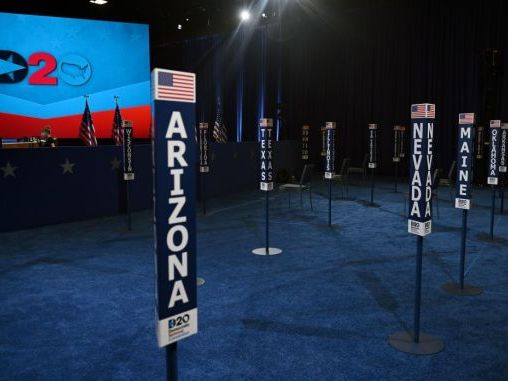Search results
The 1968 presidential campaign of Eugene McCarthy was launched by United States Senator Eugene McCarthy of Minnesota in the latter part of 1967 to vie for the 1968 Democratic Party nomination for president of the United States.
McCarthy sought the Democratic presidential nomination in the 1968 election, challenging incumbent Lyndon B. Johnson on an anti-Vietnam War platform. McCarthy unsuccessfully ran for U.S. president four more times.
Mar 12, 2016 · The first came on 12 March 1968 when Minnesota Senator Eugene McCarthy won 42% of the vote in the New Hampshire Democratic primary, against the incumbent President Lyndon Johnson. McCarthy’s performance catalyzed the growing frustration within the Democratic Party over the war in Vietnam and contributed to Johnson’s decision to abandon the ...
Dec 11, 2005 · WASHINGTON — Former U.S. Sen. Eugene J. McCarthy, D-Minn., 89, whose insurgent campaign toppled a sitting president in 1968 and forced the Democratic Party to take seriously his message...
It often seemed that Eugene McCarthy didn't want to win the White House very badly. But the relatively unknown Midwestern senator with the aloof campaign style managed to capsize the career of his party's incumbent president, Lyndon Johnson. McCarthy was a Democratic U.S. senator from Minnesota.
Eugene McCarthy’s campaign for president in 1968 appealed to youth voters and the peace movement by promising to bring a swift end to the Vietnam War. His strong showing in early primaries demonstrated President Johnson’s weakness, and inspired Robert F. Kennedy to enter the race.
Dec 12, 2005 · And when you think of 1968, you also remember Eugene McCarthy, the Democratic senator from Minnesota, whose presidential candidacy was based on opposition to the war in Vietnam and who...
May 31, 2024 · The run-up to the 1968 election was transformed in 1967 when Minnesota’s Democratic senator, Eugene J. McCarthy, challenged Democratic Pres. Lyndon B. Johnson on his Vietnam War policies. Johnson had succeeded to the presidency in 1963, following the assassination of John F. Kennedy, and had been overwhelmingly reelected in 1964.
On March 12, 1968, McCarthy stunned the nation - and the Johnson White House - when he came close to defeating the president in New Hampshire. The vote was 42 percent for McCarthy and 49 percent for LBJ.
Dec 12, 2005 · McCarthy's political zenith came in 1968, when opposition to the Vietnam War turned into a crusade to capture the Democratic presidential nomination. McCarthy didn't win. But his candidacy, and the 1968 campaign, left lasting imprints on American politics.

